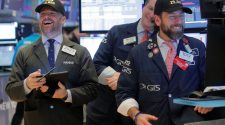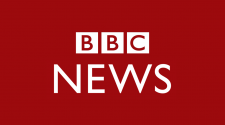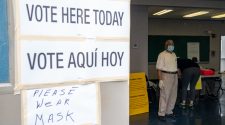A choppy day of trading on Wall Street ended Thursday with stocks broadly higher and another all-time high for the Dow Jones industrial average.
Banks and technology companies led a late-afternoon turnaround that pushed the Standard & Poor’s 500 index to a 0.8% gain, reversing the benchmark index’s losses for the week. Gains in most Dow companies, including Goldman Sachs, IBM and Cisco Systems, nudged the blue chip index to a new high for the second straight day.
Apple, Microsoft and Intel were among the winners, contributing to the rally in tech stocks. That helped the S&P 500’s technology sector break a seven-day losing streak, which reversed an early slide in the Nasdaq.
The stock indexes wavered earlier in the day, weighed down by a sell-off in healthcare stocks. Drugmakers Moderna and Pfizer closed lower following news late Wednesday that the White House supports waiving intellectual property rights for COVID-19 vaccines in order to speed up immunizations in poorer countries.
Investors continued to weigh the latest corporate earnings reports while looking ahead to a key jobs report due out Friday.
The S&P 500 bounced back from an early slide, adding 34.03 points to close at 4,201.62. The index is on track for its eighth weekly gain in the last 10 weeks. The Dow rose 318.19 points, or 0.9%, to 34,548.19. The Nasdaq composite climbed 50.42 points, or 0.4%, to 13,632.84. The tech-heavy index had been down 1.1% in the early going.
The Russell 2000 index of smaller companies also recovered from a stumble to an essentially flat finish, adding 0.05 point, or less than 0.1%, to end at 2,241.42.
Bond yields were mixed, with the 10-year Treasury note trading at a yield of 1.57%, down from 1.58% late Wednesday.
The healthcare stock slide was countered by gains in household goods makers, banks and communication companies.
Moderna lost 1.4% after the company reported its first-ever quarterly profit, helped by the company’s coronavirus vaccine. The drop was largely tied to the news from the White House, as shares of other drug companies fell, including Pfizer, which dropped 1%.
Shares of Johnson & Johnson were not hurt by the news, partly because J&J has other businesses such as Band-Aids, pain reliever Tylenol and its baby-products franchise. The stock inched up 0.4%
Stocks have mostly pushed higher on expectations of an economic recovery and strong profits this year. Massive support from the U.S. government and the Federal Reserve, and increasingly positive economic data, have also encouraged investors to push stock prices to all-time highs, despite an undercurrent of worry about inflation and the potential for higher interest rates later this year.
This week, the focus is on the health of the labor market, with the government due to report April hiring data Friday. Job growth has been one of the keys to a sustained economic rebound, but it has lagged behind other areas of the economy such as retail sales and consumer confidence.
Economists expect the April jobs data to show employers hired 975,000 workers last month as the economy accelerated out of the pandemic and vaccines rolled out nationwide. The unemployment rate is expected to drop to 5.8% from 6%.
There already have been signs that the labor market is improving. The Labor Department said Thursday that the number of Americans who filed for unemployment benefits last week fell to a pandemic low of 498,000. The payroll processing company ADP said Wednesday that private employers hired 742,000 workers last month.
On Thursday, traders sized up the latest batch of corporate earnings. Investors bid up shares in Wayfair, Kellogg and Papa John’s International after they reported results that topped Wall Street’s forecasts.
More earnings are expected Friday from Cigna, Equifax and insurance giant AIG. Of the S&P 500 companies reporting so far, 84% have topped analysts’ expectations, according to FactSet.
















